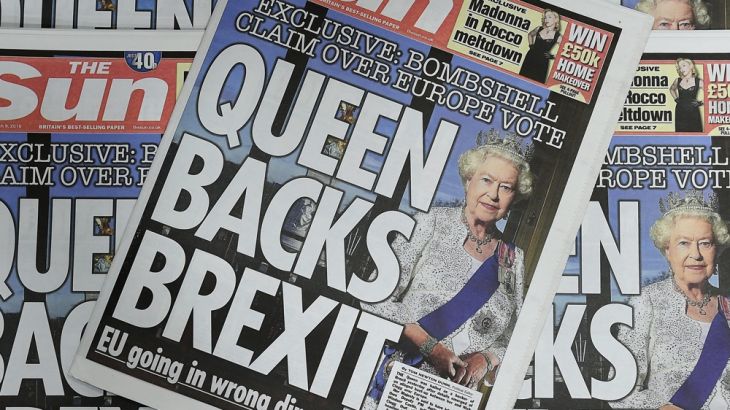Brexit named word of the year by Collins Dictionary
Widely used word to describe Britain’s withdrawal from EU was a ‘gift to headline writers everywhere,’ says Collins.

Brexit has been named the word of the year by Collins, beating topical and contemporary vocabulary weaved into today’s lexicon such as Trumpism, uberization and hygge.
Brexit – first used by Collins in 2013 – means “the withdrawal of the United Kingdom from the European Union”, according to the dictionary publisher.
Keep reading
list of 4 itemsWhy are British farmers pleading for a universal basic income?
Northern Ireland agreement could end deadlock, restore government
Forced to become British: How Brexit created a new European diaspora
“We believe that the obvious increased use of ‘Brexit’ [up 3,400 percent in 2016], its significant impact in British politics and Britain’s exit from the EU make it a word not only primed for history books but also as Collins’ Word of the Year,” Collins explained on its website. “It has divided the country, brought down a prime minister and been a gift to headline writers everywhere.”
Last year’s word of the year was binge-watch, the act of viewing a large number of television programmes in succession.
“Our lexicographers monitor word usage across all forms of media, and highlight those that are new and are gaining traction with the public, or those established words that are being used more frequently, perhaps because their meaning is changing,” said Collins.
|
|
The other nine words on the 2016 shortlist were:
Hygge: A concept, originating in Denmark, of creating cosy and convivial atmospheres that promote wellbeing.
Mic drop: A theatrical gesture in which a person drops, or imitates the action of dropping, a hand-held microphone to the ground as the finale to a speech or performance.
Trumpism: (1) The policies advocated by the US politician Donald Trump, especially those involving a rejection of the current political establishment and the vigorous pursuit of American national interests. (2) A controversial or outrageous statement attributed to Donald Trump.
Throw shade: To make a public show of contempt for someone or something, often in a subtle or non-verbal manner.
Sharenting: The habitual use of social media to share news, images, etc of one’s children.
Snowflake generation: The young adults of the 2010s, viewed as being less resilient and more prone to taking offence than previous generations.
Dude food: Junk food such as hot dogs, burgers, etc considered particularly appealing to men.
Uberization: The adoption of a business model in which services are offered on demand through direct contact between a customer and supplier, usually via mobile technology.
JOMO: Joy of missing out – pleasure gained from enjoying one’s current activities without worrying that other people are having more fun.